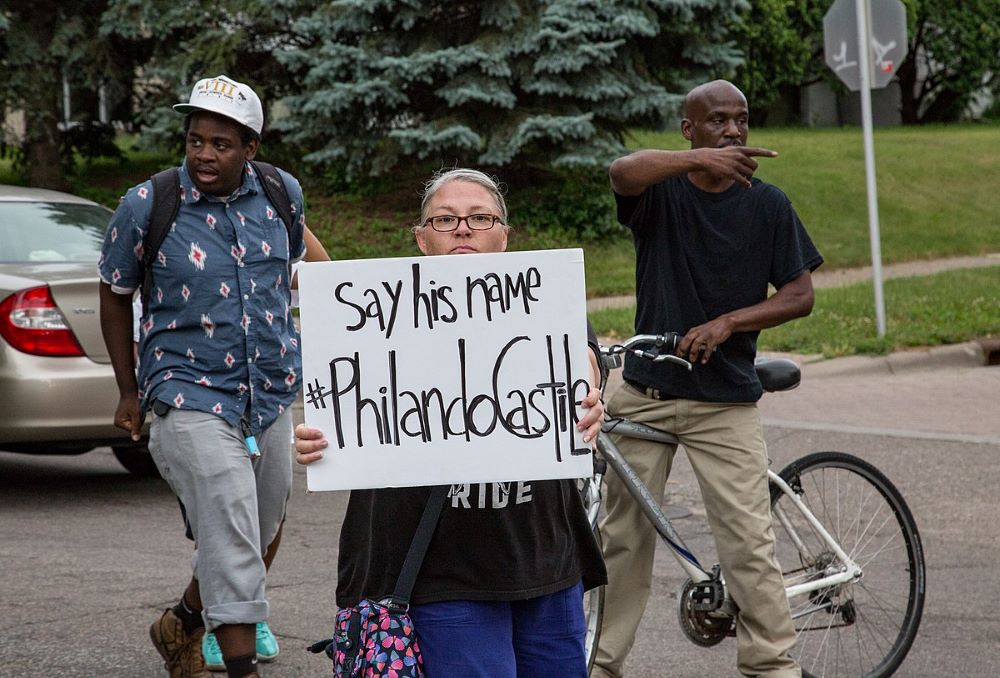
(Flickr/Tony Webster, CC-BY-SA 2.0)
On Aug. 23 we recall and remember on the International Day for the Remembrance of the Slave Trade and its Abolition. This commemoration takes on special significance this year, as we recall George Floyd, Daunte White, Adam Toledo and so many more who died horrific deaths at the hands of law enforcement — not to mention what we see daily.
We have an opportunity to respond to a call from Pope Francis to heal our relationships with God, our neighbors and the Earth. The Laudato Si' Action Platform, a collaboration between the Vatican and Catholic organizations worldwide calls us to walk the “long path to renewal” together (Laudato Si’, 202).
We received a name from our parents at our baptism or birth. This name signified that we belong to this family and no other. Recall the words of the prophet Isaiah 43:1: "I have called you by name: you are mine."
Witnessing, and protesting, we heard the chant, "Say his name! Say her name!" The name makes someone "real," a person with dignity and the right to life.
Advertisement
Pope Francis twice named George Floyd publicly in June 2020, also naming "the sin of racism" that led to Floyd's murder. "My friends," he said during a public audience, "we cannot tolerate or turn a blind eye to racism and exclusion in any form and yet claim to defend the sacredness of every human life."
That same week, the pope also called Bishop Mark Seitz of El Paso, Texas, to thank him after he knelt in prayer during a Black Lives Matter protest.
This is a strong call to each of us to stand up and end the sin of racism. How? By naming racism a sin, by naming a person murdered at the hands of law enforcement.
Living close to the state capitol in Springfield, Illinois, I frequently find myself lobbying for a myriad of causes and engaging with numerous others who chant, naming what we want. What do we want? It could be justice, equal wages, accountability or equality. We chant, "When do we want it?" In unison we reply, "Now!" Now we want equality and justice. The naming puts flesh and bones on what we are changing. It's as if it becomes a living human document.
At a 2003 academic conference on memory, Israeli historian and philosopher Moshe Idel wrote "Let me emphasize that memory … is not only a mental operation but is tightly related to loud recitation of texts and divine names, or more material operations as attaching written documents to someone's body."
It is time to recall and remember the slave trade and see it through the lens of today's violence and recognize the insidious ways it still is present. I call it the "white serpent," slithering, hissing and cunningly "lynching" minorities today. Since the first enslaved people from Africa were brought to Jamestown, Virginia, in 1619, slavery was seen as "necessary" for the economic profit of landowners. These unjust structures and systems continue to affect people of color since.
In May, Pope Francis launched the Laudato Si' action plan, which includes seven goals to be achieved within seven years. Two of my favorites are defending all life, and solidarity with Indigenous and vulnerable groups.
If you are not sure who falls under these two goals, ask yourself: Whom did COVID-19 impact the most? Who suffers most at the hands of law enforcement?
Pope Francis reminds us in Laudato Si' that " … there is an inseparable bond between concern for nature and, justice for the poor, commitment to society, and interior peace."
We know too well that there is an absence of respect for human dignity at the border and in our treatment of African Americans, Asian Americans, Indigenous peoples and poor whites. Hear the cries of the more than 1,000 Indigenous children whose remains were recently found on the grounds of former residential schools in Canada. "It was either assimilation for my ancestors or annihilation," I recently heard an Indigenous man say of removing Indigenous children from their families and punishing them for resisting conversion.
We often say, "America is a melting pot," a sentiment that seemed to solidify the white privilege mentality. It certainly ended the appreciation of diversity and cultural gifts that others bring.
We must remember. Re-membering and remembering will help us to create new ways, to evaluate and see what is good and what must be done away with. I recall many stories from my parents and relatives about the Depression, war and treatment of Jewish people. These stories helped form me and influenced my dealings with other cultures and races.
Collective remembering forms us. Sacred Scripture reminds us that, "Once you were 'no people' but now you are God's people; you 'had not received mercy' but now you have received mercy" (1 Peter 2:10).
Baal Shem Tov, founder of Hasidism, made a similar point when he said, "Forgetfulness leads to exile while remembrance is the secret of redemption." Those words appear at the exit of Yad Vashem, the World Holocaust Remembrance Center in Jerusalem.
We need to strengthen the conviction that we are one single human family. Do we hear the cries? Francis of Assisi calls us to see all as "brothers and sisters" (Fratelli Tutti) regardless of race, color or creed. It is time for you and me to act to help save the Earth and each other, for we are inseparable.
We need to strengthen the conviction that we are one single human family. Do we hear the cries?
In a late June Zoom call about Laudato Si', someone asked me: How do we achieve that ecological conversion? I suggested that there is no magic bullet, but I might have a new mind/heart-set after witnessing a horrific scene or after having an awesome natural experience. Each has the capacity to move me and help me hear the cries of the vulnerable or the Earth, and to get actively engaged in healing. To heal, we must re-member the past and not have an ostrich mentality.
Imitating Jesus' love for the poor, let us petition our legislators to formulate just policies, that seek to empower the less fortunate. Let us care for the Earth, plant a tree, grow a vegetable garden and give the abundance to the poor. Let us stand with those discriminated against and be a Good Samaritan, attending not only to their wounds, cries and pains but actively doing something positive to stop it. Not to act is to act, and it's time to make a choice.
As we re-member and recall the history of slavery and the suffering and the human lives destroyed, may we make human Francis’ two goals and allow this to be our opportunity of grace, empowering us to action and improving the lives of the less fortunate. We are the less fortunate if we fail to respond to the cries. Only together, in solidarity with those persecuted and abused, can we mend the diverse garment of humanity. It is time to re-member and to put in our “stitches” to heal and halt repetition of our earlier mistakes.





